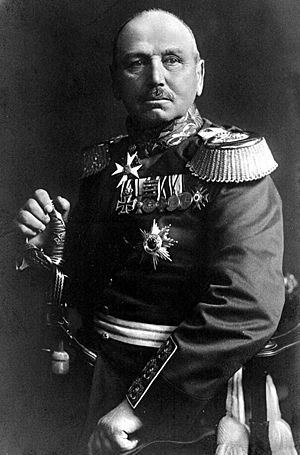Alexander von Kluck facts for kids
Quick facts for kids
Alexander von Kluck
|
|
|---|---|
 |
|
| Born | 20 May 1846 Münster, Kingdom of Prussia, German Confederation |
| Died | 19 October 1934 (aged 88) Berlin, Nazi Germany |
| Allegiance | |
| Service/ |
Prussian Army |
| Years of service | 1866-1916 |
| Rank | Generaloberst |
| Commands held | 1st Army |
| Battles/wars | Austro-Prussian War Franco-Prussian War World War I |
| Awards | Pour le Mérite |
| Other work | Author |
| Signature | |
Alexander Heinrich Rudolph von Kluck (born May 20, 1846 – died October 19, 1934) was an important German general during World War I. He led the German First Army. His actions were key in the early stages of the war.
Contents
Early Life and Military Start
Alexander von Kluck was born in Münster, a city in what was then Westphalia, on May 20, 1846. His father, Karl von Kluck, was an architect. Alexander went to school in his hometown.
In 1874, he married Fanny von Donop. They had three sons and one daughter together.
Kluck joined the Prussian army when he was young. He fought in the Austro-Prussian War in 1866. This was a short war that lasted only seven weeks. He also fought in the Franco-Prussian War. This war took place from 1870 to 1871.
During the Franco-Prussian War, he was injured twice. He showed great bravery in battle. For his courage, he received the Iron Cross, a special military award. By 1906, he had become a general. In 1913, he was put in charge of a large army district.
World War I and the Schlieffen Plan
When World War I began in 1914, General von Kluck was given command of the German First Army. This army was a very important part of Germany's war plan. This plan was known as the Schlieffen Plan.
The Schlieffen Plan aimed for a quick victory over France. It called for German armies to sweep through Belgium and northern France. The First Army, led by Kluck, was on the far right side of this advance. It was meant to move quickly towards Paris. The plan was for Kluck's army to work with the Second Army. Together, they would surround Paris.
The March Towards Paris
Kluck's First Army moved fast. They fought against British forces at the Battle of Mons and Battle of Le Cateau. Then, they chased the French Fifth Army. This chase was part of what was called the Great Retreat.
As they got closer to Paris, things changed. The commander of the Second Army, Karl von Bülow, became cautious. He stopped his advance and asked Kluck for help. Kluck's First Army was already far ahead. Kluck wanted to keep moving around the French army. But he was ordered to support Bülow's attack.
On August 30, Kluck made a big decision. He decided to turn his army to the east of Paris. This meant he was no longer following the original Schlieffen Plan. He wanted to help Bülow's Second Army.
The Battle of the Marne
By turning east, Kluck created a large gap in the German lines. This gap was about 30 miles wide. It stretched towards Bülow's army. This move also left Kluck's right side open. What Kluck didn't know was that a new French army was near Paris. This was General Michel-Joseph Maunoury's Sixth Army.
On September 3, the French learned about Kluck's change in direction. They got reports from their aircraft. Radio messages also confirmed it. This information was very important.
On September 5, Maunoury's French Sixth Army attacked Kluck's open right side. This attack started the First Battle of the Marne. Kluck quickly moved some of his troops to defend against this attack. He took soldiers from the gap between his army and the Second Army.
On September 8, the French Fifth Army attacked Bülow's Second Army. This made the gap in the German line even wider. The British army then moved into this open space.
Kluck believed he would win the battle the next day. But on September 9, a German officer ordered a retreat for all armies. This happened even though Kluck's army was doing better. The Germans pulled back about 40 miles to the Aisne River.
Aftermath of the Marne
The failure of the German armies to work together was a big problem. Kluck and Bülow did not coordinate well. This led to the failure of the Schlieffen Plan. Instead of a quick victory, the war turned into a long stalemate. Soldiers dug trenches and fought from them for years.
Many German military experts still praise Kluck. They believe he was a brave and skilled leader. Kluck's favorite quote from Julius Caesar was: "In great and dangerous operations one must not think but act."
Retirement and Later Life
In March 1915, General von Kluck was inspecting his troops. He was hit by shrapnel, which are small metal pieces from an explosion. He received seven wounds and his leg was badly injured. Soon after, he was awarded the Order Pour le Mérite. This was Germany's highest military honor.
In October 1916, Kluck retired from the army. His son, Lieutenant Egon von Kluck, had been killed in early 1915.
After the war, General von Kluck wrote about his experiences. He published a book called The March on Paris and the Battle of the Marne in 1920. Alexander von Kluck passed away in Berlin in October 1934.
Images for kids
See Also
 In Spanish: Alexander von Kluck para niños
In Spanish: Alexander von Kluck para niños
 | Jewel Prestage |
 | Ella Baker |
 | Fannie Lou Hamer |


